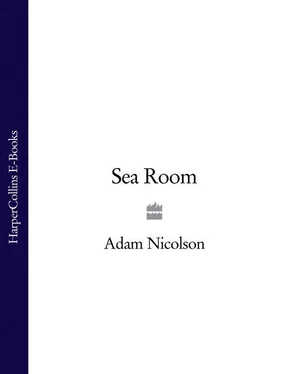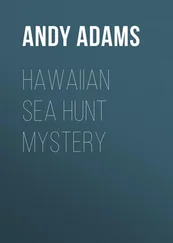It would have been tricky work, getting the dinghy away from the beach, with the sea coming straight on to them, then sailing the boat away from the now aggressive and surf-lined shore. These long-keeled, broad-beamed boats do not point high into the wind. You are lucky if you can bring the boat to within sixty degrees. The wind that day had become a gale. The seas as they arrived at the Shiant shore were kicking up into long, whitened combers, driving into the notches and crannies of the coastline where they burst into plumes reaching fifty or sixty feet on to the grass. But the boys knew what they were doing. Keeping just out from the shore, with the boat on a broad reach, they could make their way to the far corner of Garbh Eilean. Donald Campbell told their fathers that he had watched them get away, pulling with the oars to begin with and then hoisting the sail, covering the mile or so westwards at a fair pace, reaching the far point of Garbh Eilean, the headland called Stocanish, before disappearing around the corner.
No one can know what happened next. Out there, beyond Stocanish, in a southwesterly gale, with the tide ebbing southwards, can be as good a version of hell as the Hebrides can offer. I have taken Freyja in there on a bad day; not a gale but blowing perhaps Force 5 or 6 with the ebb coming down from Cape Wrath. The sea picks up. When you are in among it, there seems to be no pattern. It stands in little peaks all around you, like the points into which the whipped whites of egg can be made to stand. Or more like that miniature thorny landscape which is left behind if you pick one recently glued plank away from another. As the two separate, the glue is pulled up into little pinnacles with sharp, cup-shaped valleys between them. There is no structure to this form, no readable order, just a little world of mobile chaos, a dancing three-dimensional spiky surface through which you can only hope to make your way. It is disconcerting even in a slight wind, the randomness of it, the unpredictability of those mobile pin-ranges, the lurching and jumping of the boat from one side to another, the steep little walls of sea that the wind makes against the tide, the picture of anarchy and its primordial threat. If you increase the energy in that system, if you turn a gale on to it, if you make these water pinnacles eight rather than four feet high, this stretch of sea would be unsailable.
After an hour or so the Campbells started to get worried. The Lemreway boys had not come back to the house. Donald sent his son John, a blond giant who was deaf and dumb, down to the beach connecting Garbh Eilean and Eilean an Tighe to see if he could make out what was happening in the bay. John returned, highly agitated, somehow communicating to his father the fact that the boat was not to be seen. It had vanished. The Lemreway boys had left their provisions in the Campbells’ house. Clearly they had been intending to stay. Where were they now? The Campbells guessed, or so they told the Lemreway men the next day, that once the boys had got round the corner at Stocanish, they had thought they had better run for home. As soon as the fathers heard this from Donald Campbell, they knew the boat was lost, and without pause set off for the Lewis shore. They searched loch after loch there, hoping to find the boys sheltering from the storm, or driven in there perhaps with their gear broken. They nosed into all the corners of Loch Claìdh, into Bagh Ciarach, Loch Valamus, Loch Bhrollúm, at Camas Thomascro, at Mol Truisg and in the further reaches of Loch Sealg. Their sons were in none of them.
It wasn’t a stupid exercise. The Lewis coast has always provided shelter from the Stream of the Blue Men but in 1881 the boys from Lemreway were never seen again. The rudder of the boat was found a little later washed up on the Mol Bhan , the blond beach, near Orinsay, a few miles west of Lemreway. Timber was scarce in the Hebrides and the rudder was used for more than forty years as a foot-bridge across the stream that runs down over its pale pebbles on to the beach there. It was the way people took back to the village from the peat-bank and nothing was more welcome, when loaded down with peats, than to find the stream properly bridged, an easy step or two across a difficult passage.
A few weeks later, a rudderless Orkney-built boat was found drifting around Cape Wrath, seventy-five miles away to the north. It was recognised by the Lewis fishermen who came across it as the boat that had been lost at the Shiants. There were sickles stowed away in the gunwale. Shortly before the boys had taken the boat to the islands, it had been used for gathering the seaweed that was to be spread on the fields just before the spring sowing of the oats and the barley. The sickles had been left aboard, jammed between the gunwale and the stringer. The sea had clearly turned the boat over twice: once to drown Murdo Macmillan, John Macinnes, Angus Ferguson and Donald Macdonald, and once to set it on its way again to Cape Wrath, with its cargo of sickles intact.
In 1910, another generation of boys, this time from the village of Gravir, just north of Lemreway, set off on the same summer expedition for the Shiants. The party included fourteen-year-old Donald MacPhail. It was the ‘last sad summer of my boyhood’, as he wrote as an old man, before he was sent away as a scholar to the Nicolson Institute, the secondary school in Stornoway, to fulfil his father’s ambitions for him to have ‘a gentleman’s job, chained to a desk, a school room, pulpit or doctor’s surgery.’ He was going to make the best of his last weeks of freedom.
One fine day, with three other boys, I decided to make a hail and farewell trip to the Shiant Islands. My father was away fishing, and my mother did not like the idea very much; however my heart was set on the trip and after getting up early and packing some food and drink in a small cask, we set sail, swathed in the calm early morning sunshine.
When they arrived, they ‘roamed all over the island, collected a lot of eggs and watched the thousands of birds that assembled on the cliffs. We had taken shotguns and ammunition and passed the time away shooting at the puffins.’
Only on the way home from their puffin-shooting trip did the schoolboy crew find themselves in trouble. As they left the Shiants, the wind that day seemed suddenly to get up from the north-west – almost precisely the direction they needed to go – and the boat had far too little weight in it to push itself into the wind.
The bright calmness of the morning gave way to a darkening moody sky and we began to have difficulty beating against the wind in our light, unballasted boat. As the sea got choppy we shortened the sail and had to take it in turns to bale out furiously as the spray washed over the boat making it harder for us to steer and retain control.
Eventually, after many hours, late in the evening, they managed to get into the shelter of Kebock Head, tucked in under its big brutish cliffs, which could protect them from the northwesterlies. A little pool of still water lay under the lee of the headland itself. There they had to wait on their oars, unable, with this wind, to sail up Loch Odhairn into Gravir. At midnight, the boys heard the thudding note of a propeller. They set light to a tarred rag and attracted the attention of a trawler which towed them home. Their parents were out searching on the headlands and nobody noticed the trawler coming into the loch bringing their sons in from the sea. The last hope, so they guessed, was that the boys might be sheltering under Kebock Head, and the Gravir families made their way there across the moor. ‘When they arrived at the Cabag [the Gaelic spelling of Kebock Head] and discovered that there was no sign of our whereabouts they feared the worst.’ Donald MacPhail put the experience behind him. ‘The menacing mass of the Shiant Islands,’ he wrote many years later, ‘never again held any mystery for me. Only a painful memory. My father saw to that.’
Читать дальше












